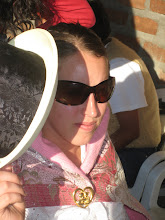After a temporary suspension of the Presupuesto Participativo, it was resumed last Thursday by two technical specialists from the regional municipality. Basically they started the entire process over, which meant more useless, unproductive hours of hearing the same information repeated again. During the second meeting, Susan started drawing pictures of how to make the meeting better. Some examples: Punching the tech guy in the face, computer failure, chair fight, sedatives. The speaker managed to make a power point presentation that consisted of a mere 6 slides last for 3 hours. When he reached the slide about the environment he got sidetracked for a good 30 minutes before coming around to the topic at hand, at which point he decided to explain the benefits of improved cooking stoves. As he began to explain that traditional stoves consume wood, I figured he would follow through by explaining that the improved stoves are favorable because they consume less wood. Wrong. Out of the blue, he burst into an animated description of how the specific wood burned in the stoves emits toxic fumes and that improved stoves are good because the highly dangerous, life-threatening smoke is funneled outside into the environment. Amazingly, Susan and I made it through that meeting with out injuring ourselves or committing any crimes.
Voting day finally arrived and Susan and I were pleasantly surprised when we were both granted funds for our projects. Nonetheless, the meeting was no exemplary demonstration of democracy. While the meetings leading up to the voting suggested that voting would actually take place, what actually occurred was rather different. First of all, we were presented with a pre-prepared list of the projects that had been accepted along with the funds to be allocated to each. Then each agente participante, a person with the ability to voice their opinion and to vote, was allowed to defend/dispute the decision which had been made with regard to their project. Flaw 1: no actual changes reflecting the opinions of the people were made. Imperceptible word changes were made which appeased the majority, but no critical semantic changes occurred. With regard to the funds allocated, not a single change was made. I raised the point that spending 20,000 soles to improve the bathrooms in the market was absurd, especially given that this project was never previously discussed but randomly appeared on the list of approved projects. Everyone agreed but nothing changed. Flaw 2: there will be no accountability for those projects that have been approved. Take the bathroom project. With regard to the complaint I raised, I was told that any money that remained from the renovation would be used elsewhere. The problem is that elsewhere probably means the mayor’s own pocket. No one was required to turn in a profile of their projects and no research was done to determine how much money the projects will actually cost. All of the money that was designated for projects was listed in nice even sums like 10,000 or 40,000 soles with no breakdown of what that money will be spent on. I’ve heard that it is a common practice to receive the money and then bribe people to write false receipts to account for money that is spent elsewhere. Flaw 3: Peruvian law was blatantly overlooked at least twice. Indeed, I was present as an agente participante despite the fact that this is illegal according to Peruvian law. At the end of the meeting they tried to elect me as the president of the comité de vigilancia, the committee which ensures that the funds are allocated and spent correctly. I pointed out that it was illegal for me to accept the post and that it should be held by a Peruvian who actually understands how the system works. However, they proceeded to elect me to the position of treasurer on the Consejo de Coordinación Local, apparently a very important committee. Given that I don’t have any idea what its function is and that I detest balancing checkbooks, I think it was a bad idea to elect me. Regardless, I gave up arguing the legality of the issue and accepted anyway.
The bottom line is that this process could be a very effective way to distribute funds within the country but it isn’t. Corruption and an uneducated populace prevent it from being a positive step towards sustainable development.
Friday, July 11, 2008
Subscribe to:
Post Comments (Atom)

No comments:
Post a Comment